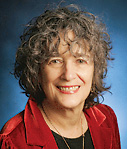American higher education is under siege at many levels, but the voice of one of the main constituents — faculty members — has been missing in the conversation, says Ellen Schrecker, a history professor at Yeshiva University.
Pundits and politicians blame professors for academic woes without listening to the professors’ side of the story, while administrators shake up their campuses without consulting their faculties about the educational value of those changes, says Schrecker, who will speak at U-M this month.

Faculty, students and schools are threatened by fiscal strict budgets, attacks on faculty unions, double-digit tuition increases and dwindling academic freedom — and the list is growing, she says.
“We need to amplify the faculty’s voice and pay attention to what the men and women who actually deliver the academic goods have to say,” says Schrecker, who will give the 2011 U-M Senate’s Davis, Markert, Nickerson Lecture on Academic and Intellectual Freedom.
The lecture — “The Lost Soul of Higher Education: Corporatization, the Assault on Academic Freedom, and the End of the American University” — is free and open to the public at 4 p.m. Oct. 13 in Honigman Auditorium at the Law School.
The lecture is named for three faculty members — Chandler Davis, Clement Markert and Mark Nickerson — who in 1954 were called to testify before a Congressional Committee on Un-American Activities. All invoked constitutional rights and refused to answer questions about their political associations.
All three were suspended from the university. Markert subsequently was reinstated, and Davis and Nickerson were dismissed.
Schrecker’s talk analyzes the roots of academia’s current predicament, which stem from two different, but related, phenomena. Both, she notes, have led to the increasing marginalization of faculty members within the nation’s colleges and universities.
One is a political campaign against the academic profession that began as a backlash against the 1960s and the so-called “tenured radicals” who, it was believed, were undermining support for the American system through their teaching and writing.
The other, and more important, element in this analysis is the ongoing financial crisis that began in the late 1960s and early 1970s and that produced major structural changes within the academic community, she says. Among those changes is the enormous growth in the size of university administrations and the replacement of tenured and tenure-track professors with part-time and temporary instructors.
“Together these two phenomena have forced the academy onto the defensive even as politicians, pundits, and ordinary citizens are focusing ever more intensively on its centrality as the main engine of social mobility and economic growth,” Schrecker says.
Whether or not American higher education can fulfill such, the combination of financial cutbacks along with unrealistic demands for accountability will only ensure disappointment and fuel further attacks on an already beleaguered system, she says.
Schrecker’s talk is based on her book, “The Lost Soul of Higher Education” (2010). She has written extensively on McCarthyism and academic freedom, and among her other publications are “Many Are the Crimes: McCarthyism in America” (1998) and “No Ivory Tower: McCarthyism and the Universities” (1986).
Active in the American Association of University Professors, she is the former editor of its magazine, Academe, and a member of its Committee A on Academic Freedom and Tenure. She currently is working on a general study of political repression in the United States.

